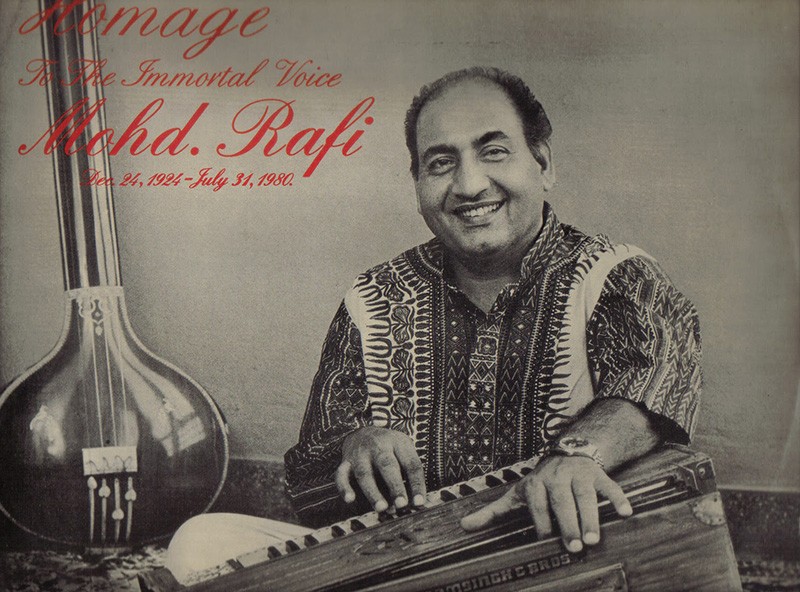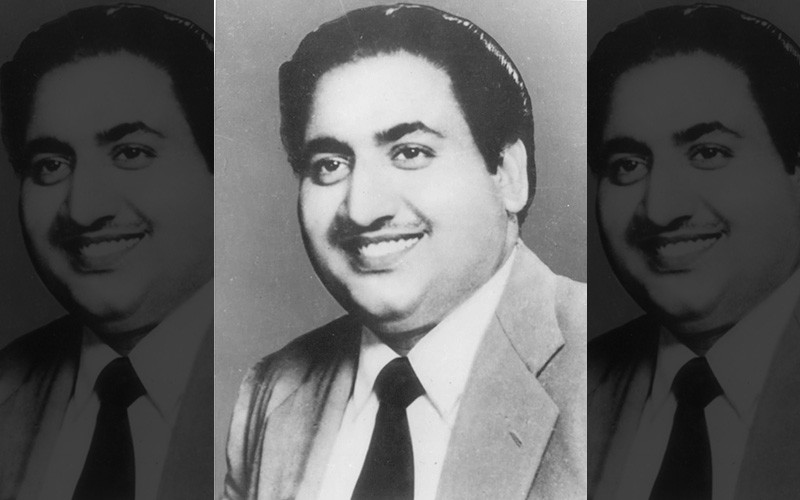The golden voiced Rafi
The golden-voiced Mohammad Rafi’s birth centenary falls on December 14, 2024. Shoma A. Chatterji offers a brief glimpse into the life and times of this legend of Indian film music in a year-end tribute

Mohammad Rafi passed away at the relatively young age of 55 but within that brief span, he left behind an entire treasury of music and songs, mainly in the form of film songs of every hue and colour - be it a ghazal, a thumri, a fast dance number, a duet, a Sufi-style number, a quawali, a love song, a dirge, you name it and Mohammad Rafi had sung it.
He took everything in his stride – soft solos, sad solos, peppy duets, or universal songs like ehsaan tera hoga mujhpar and many others. Music happens to be among the most secular among creative arts. Otherwise, how could Mohammad Rafi, a practicing Muslim, create such wonderful songs like Man tarpat hari darshan ko aaj, or, O Duniya Ke Rakhwale from the film Baiju Bawra about a Hindu musical saint which remain hot sellers till today?
Then there is the Yahoo number from the box office hit Junglee tuned to Shankar-Jaikishen’s music which gave a major boost to the career of Shammi Kapoor.
Rafi’s talent was discovered almost by an accident of fate in Lahore in then undivided India. He was just 17 years old. There was a musical concert in Lahore where K.L. Saigal was the biggest draw. But because of an electrical short circuit which silenced the sound and darkened the auditorium, the young Rafi was requested to substitute for Saigal-saab.

In the audience was the then-known music director Shyam Sundar who saw the musical talent in the young boy and brought him to Mumbai. Rafi’s cherished dream of singing with K.L. Saigal became a reality when Naushad gave him two lines to sing in the film Shah Jahan featuring Saigal.
Naushad, reported to have discovered the wide range Rafi-saab was capable of, once said, “Rafi-saab had tremendous potential for the higher notes too and I used this talent in films like Deedar, Amar, Uran Khatola and most importantly, in Baiju Bawra.”
He finally arrived when Naushad discovered his range, his stamina in holding on to a note and raising it to the highest pitch when he used him in the film Pehle Aap (1944) to sing a duet with the great Noor Jehan in the thumping box office hit Anmol Ghadi. He remained in that enviable position for the next 25 years mainly singing in duets with Lata Mangeshkar popular even now. He also sang in languages other than Hindi and Urdu and is known to have recorded a few Nazrul Geetis in Bengali too.
Though Rafi found himself sidelined by the then-established playback singers who were favoured by different producers, directors and music directors because each actor/producer/director/music director had his preference such as Raj Kapoor sticking to Mukesh, Dilip Kumar had a special place for Talat Mahmood and Dev Anand for Kishore Kumar.
But once he established a good rapport with Naushad specially when he played-backed for Dilip Kumar for the film Jugnu he struck gold and never turned back.
Rafi hit the heights of popularity with his patriotic tribute to Mahatma Gandhi Suno suno Ae Duniyawalon Bapuji Ki Amar Kahani composed by Husnlal Bhagatram and written by Rajendra Krishen. He was invited by the Indian Prime Minister, Pandit Jawaharlal Nehru to sing at his house.
In 1948, Rafi received a silver medal from Jawaharlal Nehru on Indian Independence Day. This happened within four years of his migration to Mumbai, a miraculous feat in the midst of stiff competition from the music industry there.
Right through his career of forty years, one never saw him arrogant, his fame as a great singer notwithstanding.
Once Lata Mangeshkar and Rafi had a tiff demanding five percent of royalties on the sale of records to be given to the singers in addition to the fees. Rafi went against the argument of royalty. The tiff became so ugly that the two vowed never ever to sing together.

Music directors, producers and lyricists were in a fix because they did not have a clue about who would accompany Rafi-saab in the duets. This led to a rise of other female playback singers like Shamsad Begum, Asha Bhonsle and many others.
This was an unexpected turn of events giving a fillip to careers of female artistes at a time when Lata Mangeshkar ruled the roost and no one could touch her, nor did producers and music directors dream of working without her.
Later Lata-ji said about Rafi-saab on his 30th death anniversary, “Rafi bhaiya was not only India’s greatest playback singer but also a wonderful person. I am yet to come across another artist so modest, dignified and unassuming.
The blessings of Goddess Saraswati were with him and this was responsible to a great extent for his iconic success and he believed in true sadhana. Every morning he practised his riyaz like a devoted singer and rehearsed before recording each song.” Two books have been written on this great singer who made India proud not only in his native country but right across the globe.
One of them, Mohammed Rafi – Golden Voice of the Silver Screen, was jointly authored by Shahid Rafi, his son, (he had seven children from two marriages) and Sujata Dev in 2015. The book states that Rafi sang 4,425 Hindi film songs, 310 non-Hindi film songs, and 328 non-film songs between 1945 and 1980. A 2015 Manorama article states that ‘researchers’ have found 7,405 songs sung by Rafi Saab. A long documentary was also made on him and the Indian Posts and Telegraphs has also brought out a First Day Cover and a stamp in 2016 to commemorate in his memory.
Images: Curated by Author
IBNS
Senior Staff Reporter at Northeast Herald, covering news from Tripura and Northeast India.
Related Articles

Arbaaz Khan, Sshura Khan welcome baby girl: Reports
Bollywood actor and superstar Salman Khan's brother Arbaaz Khan and wife Sshura Khan have welcomed a baby girl on October 5, media reports said.

Veteran actress Sandhya, wife of legendary filmmaker V. Shantaram, passes away at 94
Mumbai/IBNS: Veteran actress Sandhya, best remembered for her iconic performances in Jhanak Jhanak Payal Baaje and Pinjara, passed away on Friday at the age of 94, family sources confirmed.

Alia Bhatt says breastfeeding helped her in postpartum weight loss process: 'It burns a lot of calories'
Mumbai/IBNS: One of the biggest challenges an actress faces post pregnancy was to shed the excess weight and resume work but Bollywood star Alia Bhatt was presumably quick to get into shape.

Viral video: Ex-couple Deepika Padukone and Ranbir Kapoor reunite at airport, share a warm hug
Mumbai/IBNS: The video of ex-couple Deepika Padukone and Ranbir Kapoor sharing a warm hug at the airport went viral on social media on Saturday morning.
Latest News

18 Bangladeshi immigrants escape from Narsingarh detention camp

Belonia Women PS refused to register gang rape case, suggests victim to lodge complaint before Gram Panchayat

Crackdown on high decibel fire cracker launched by district administration, TSPCB

Odia Samaj Tripura bring free healthcare to Durgabari tea estate community

